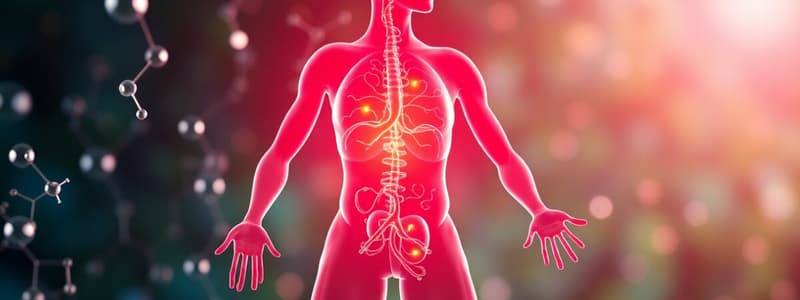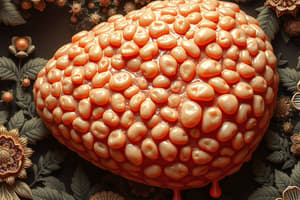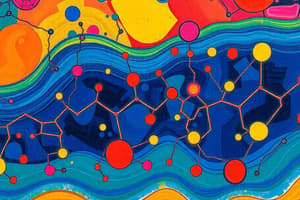Podcast
Questions and Answers
What is the primary source of glucose during gluconeogenesis?
What is the primary source of glucose during gluconeogenesis?
- Glycogen
- Lactate
- Muscle protein (correct)
- Fatty acids
During starvation, which process continues to provide glucose after glycogen stores are depleted?
During starvation, which process continues to provide glucose after glycogen stores are depleted?
- Gluconeogenesis (correct)
- Oxidative phosphorylation
- Lipolysis
- Glycogenolysis
What is the fate of muscle protein degradation after approximately 7 days of starvation?
What is the fate of muscle protein degradation after approximately 7 days of starvation?
- It continues at the same rate
- It accelerates significantly
- It slows down (correct)
- It ceases completely
Which of the following molecules can serve as an energy source for the brain during starvation?
Which of the following molecules can serve as an energy source for the brain during starvation?
In skeletal muscle, which of the following is NOT a method of ATP generation?
In skeletal muscle, which of the following is NOT a method of ATP generation?
What type of glycolysis occurs in skeletal muscle when oxygen is lacking?
What type of glycolysis occurs in skeletal muscle when oxygen is lacking?
Which receptors are primarily located in the liver and responsible for the effects of glucagon?
Which receptors are primarily located in the liver and responsible for the effects of glucagon?
What substrate conversion by the phosphagen system allows for the rapid resynthesis of ATP during a sprint?
What substrate conversion by the phosphagen system allows for the rapid resynthesis of ATP during a sprint?
What is the role of GLUT4 in glucose uptake?
What is the role of GLUT4 in glucose uptake?
Which substrate is NOT used for gluconeogenesis when glycogen stores are depleted?
Which substrate is NOT used for gluconeogenesis when glycogen stores are depleted?
What is the primary source of glucose during fasting?
What is the primary source of glucose during fasting?
Which enzyme is primarily involved in the conversion of pyruvate to Acetyl-CoA?
Which enzyme is primarily involved in the conversion of pyruvate to Acetyl-CoA?
What process provides substrates for gluconeogenesis after glycogen depletion?
What process provides substrates for gluconeogenesis after glycogen depletion?
During fasting, fatty acids are primarily mobilized from which tissue for energy production?
During fasting, fatty acids are primarily mobilized from which tissue for energy production?
In the absence of insulin, which of the following processes is likely to increase?
In the absence of insulin, which of the following processes is likely to increase?
Which of the following statements about fatty acid synthesis is true?
Which of the following statements about fatty acid synthesis is true?
What is the immediate energy source for up to 15 seconds of muscle activity?
What is the immediate energy source for up to 15 seconds of muscle activity?
Which metabolic pathway starts when the muscle requires additional ATP beyond what is provided by phosphocreatine?
Which metabolic pathway starts when the muscle requires additional ATP beyond what is provided by phosphocreatine?
Which type of muscle activity primarily relies on oxidative phosphorylation for ATP production?
Which type of muscle activity primarily relies on oxidative phosphorylation for ATP production?
What does Acetyl CoA primarily derive from in muscle activity?
What does Acetyl CoA primarily derive from in muscle activity?
During intense muscle activity lasting a few seconds, which source of ATP is almost fully depleted after 3 seconds?
During intense muscle activity lasting a few seconds, which source of ATP is almost fully depleted after 3 seconds?
Which pathway generates the least amount of ATP per glucose molecule compared to others?
Which pathway generates the least amount of ATP per glucose molecule compared to others?
What is the primary substrate for the TCA cycle during muscle activity?
What is the primary substrate for the TCA cycle during muscle activity?
How many ATPs are produced during glycolysis?
How many ATPs are produced during glycolysis?
What is the primary role of the liver during the well-fed state?
What is the primary role of the liver during the well-fed state?
Which of the following statements best describes the action of insulin in the liver during the well-fed state?
Which of the following statements best describes the action of insulin in the liver during the well-fed state?
How does the liver maintain normal plasma glucose levels during the well-fed state?
How does the liver maintain normal plasma glucose levels during the well-fed state?
What happens to excess amino acids in the liver during the well-fed state?
What happens to excess amino acids in the liver during the well-fed state?
What does the liver synthesize in addition to fatty acids during the well-fed state?
What does the liver synthesize in addition to fatty acids during the well-fed state?
Why is the liver described as a 'lipogenic liver' during the well-fed state?
Why is the liver described as a 'lipogenic liver' during the well-fed state?
Which hormone is primarily responsible for facilitating glucose uptake in tissues during the fed state?
Which hormone is primarily responsible for facilitating glucose uptake in tissues during the fed state?
What is the role of GLUT2 in the liver?
What is the role of GLUT2 in the liver?
What metabolic effect does insulin have on glucose uptake in the liver?
What metabolic effect does insulin have on glucose uptake in the liver?
Which enzyme is directly activated by insulin to promote glycogenesis?
Which enzyme is directly activated by insulin to promote glycogenesis?
Which metabolic pathway is NOT promoted by insulin in a well-fed state?
Which metabolic pathway is NOT promoted by insulin in a well-fed state?
What is the role of Acetyl-CoA carboxylase in the liver under the influence of insulin?
What is the role of Acetyl-CoA carboxylase in the liver under the influence of insulin?
Which enzyme is involved in cholesterol synthesis that is activated by insulin?
Which enzyme is involved in cholesterol synthesis that is activated by insulin?
How does insulin affect the metabolic state in resting skeletal muscle?
How does insulin affect the metabolic state in resting skeletal muscle?
Which of the following processes is stimulated by insulin during a well-fed state?
Which of the following processes is stimulated by insulin during a well-fed state?
What is the primary role of glucokinase in carbohydrate metabolism?
What is the primary role of glucokinase in carbohydrate metabolism?
In the context of insulin action, which of the following pathways is activated?
In the context of insulin action, which of the following pathways is activated?
What is the common outcome of high insulin levels in the liver?
What is the common outcome of high insulin levels in the liver?
What is the effect of glucagon on glycogen breakdown in the liver?
What is the effect of glucagon on glycogen breakdown in the liver?
How does low plasma glucose influence gluconeogenesis in the liver?
How does low plasma glucose influence gluconeogenesis in the liver?
Which enzyme is inhibited by glucagon during glycolysis in the liver?
Which enzyme is inhibited by glucagon during glycolysis in the liver?
What metabolic pathway is primarily activated by glucagon to produce ketone bodies?
What metabolic pathway is primarily activated by glucagon to produce ketone bodies?
What happens to glycogen storage during prolonged fasting?
What happens to glycogen storage during prolonged fasting?
Which of the following statements is true regarding fatty acid mobilization during fasting?
Which of the following statements is true regarding fatty acid mobilization during fasting?
What role does fructose 2,6-bisphosphatase play in the presence of glucagon?
What role does fructose 2,6-bisphosphatase play in the presence of glucagon?
Which key substance is produced from amino acids during gluconeogenesis facilitated by glucagon?
Which key substance is produced from amino acids during gluconeogenesis facilitated by glucagon?
What is the main target for glucagon in adipose tissue during fasting?
What is the main target for glucagon in adipose tissue during fasting?
Which cycle is involved in the conversion of Acetyl CoA to ketone bodies?
Which cycle is involved in the conversion of Acetyl CoA to ketone bodies?
Flashcards
Well-fed state metabolism
Well-fed state metabolism
In the well-fed state, high glucose levels trigger insulin release, promoting glucose uptake by insulin-dependent tissues (e.g., muscles, adipose) via GLUT4. The liver independently takes up glucose via GLUT2, and insulin then enhances glycolysis, glycogenesis (glycogen storage), lipogenesis (fat storage), and protein synthesis in the liver. Dietary fats are processed into chylomicrons and transported to tissues. Excess amino acids are converted into fats.
Insulin's role in metabolism
Insulin's role in metabolism
Insulin promotes glucose uptake, glycogen storage, fat synthesis, and protein synthesis, especially in the liver, muscles, and adipose tissue. It promotes energy storage rather than breakdown when sufficient energy is available.
Glucose uptake (well-fed)
Glucose uptake (well-fed)
Elevated blood glucose levels trigger insulin release. Insulin activates glucose transport into specific tissues (like muscles and adipose) via GLUT4 receptors. The liver also takes up glucose independently through GLUT2 receptors.
Glycogenesis
Glycogenesis
Signup and view all the flashcards
Lipogenesis
Lipogenesis
Signup and view all the flashcards
Liver's role in metabolism
Liver's role in metabolism
Signup and view all the flashcards
Chylomicrons
Chylomicrons
Signup and view all the flashcards
Gluconeogenesis
Gluconeogenesis
Signup and view all the flashcards
Lipogenic Liver
Lipogenic Liver
Signup and view all the flashcards
Insulin's Role in Lipogenesis
Insulin's Role in Lipogenesis
Signup and view all the flashcards
What happens to glucose in the liver?
What happens to glucose in the liver?
Signup and view all the flashcards
What's the role of Acetyl-CoA Carboxylase?
What's the role of Acetyl-CoA Carboxylase?
Signup and view all the flashcards
What's the role of Fatty Acid Synthase?
What's the role of Fatty Acid Synthase?
Signup and view all the flashcards
How does the fed state affect the liver?
How does the fed state affect the liver?
Signup and view all the flashcards
What happens to excess amino acids in the fed state?
What happens to excess amino acids in the fed state?
Signup and view all the flashcards
What are chylomicrons?
What are chylomicrons?
Signup and view all the flashcards
How does the liver handle dietary fats?
How does the liver handle dietary fats?
Signup and view all the flashcards
How does insulin affect glucose uptake in the liver?
How does insulin affect glucose uptake in the liver?
Signup and view all the flashcards
What is the main source of glucose for the body in a fasting state?
What is the main source of glucose for the body in a fasting state?
Signup and view all the flashcards
What are three substrates for gluconeogenesis?
What are three substrates for gluconeogenesis?
Signup and view all the flashcards
What happens to fatty acids during fasting?
What happens to fatty acids during fasting?
Signup and view all the flashcards
How does the liver use fatty acids during fasting?
How does the liver use fatty acids during fasting?
Signup and view all the flashcards
Fasting State
Fasting State
Signup and view all the flashcards
Glucagon's Role
Glucagon's Role
Signup and view all the flashcards
Lipolysis
Lipolysis
Signup and view all the flashcards
Prolonged Fasting
Prolonged Fasting
Signup and view all the flashcards
Metabolic Shift in Prolonged Fasting
Metabolic Shift in Prolonged Fasting
Signup and view all the flashcards
Target Effects of Glucagon
Target Effects of Glucagon
Signup and view all the flashcards
Impact on Liver Metabolism
Impact on Liver Metabolism
Signup and view all the flashcards
Gluconeogenesis in Starvation
Gluconeogenesis in Starvation
Signup and view all the flashcards
Muscle Protein Degradation During Starvation
Muscle Protein Degradation During Starvation
Signup and view all the flashcards
Glycerol Role in Starvation
Glycerol Role in Starvation
Signup and view all the flashcards
Ketone Bodies in Starvation
Ketone Bodies in Starvation
Signup and view all the flashcards
What is the main source of glucose production during starvation?
What is the main source of glucose production during starvation?
Signup and view all the flashcards
What happens to muscle protein after 7 days of starvation?
What happens to muscle protein after 7 days of starvation?
Signup and view all the flashcards
Where are glucagon receptors found?
Where are glucagon receptors found?
Signup and view all the flashcards
Beta-Adrenergic Receptors in Fed and Fasting State
Beta-Adrenergic Receptors in Fed and Fasting State
Signup and view all the flashcards
ATP for 3 seconds
ATP for 3 seconds
Signup and view all the flashcards
ATP for 15 seconds
ATP for 15 seconds
Signup and view all the flashcards
Anaerobic glycolysis
Anaerobic glycolysis
Signup and view all the flashcards
ATP for longer activity
ATP for longer activity
Signup and view all the flashcards
What is oxidative phosphorylation?
What is oxidative phosphorylation?
Signup and view all the flashcards
How do muscles get ATP for extreme activities?
How do muscles get ATP for extreme activities?
Signup and view all the flashcards
What is β-oxidation
What is β-oxidation
Signup and view all the flashcards
What is the TCA cycle?
What is the TCA cycle?
Signup and view all the flashcards
Study Notes
Integrative Tissue Metabolism
- Dr. Alawi Habara, Assistant Professor in the Department of Biochemistry at Imam Abdulrahman Bin Faisal University (IAU), is the presenter.
- Dr. Habara has degrees in MBBS, MSc (Medical Genetics), and PhD (Molecular & Translational Medicine).
Learning Objectives
- Understand the differences in fuel metabolism during various body states (fed, fasting, and starvation).
- Understand how hormones (insulin & glucagon) affect metabolism.
- Learn about heart muscle energy production.
- Learn about skeletal muscle energy systems.
- Understand red blood cell and glutathione production.
The Liver
- The liver is critical for maintaining overall body homeostasis.
- It performs numerous biochemical processes essential for life.
- The liver processes, stores, and distributes almost all nutrients.
- The liver is central to carbohydrate, lipid, and protein metabolism.
- It plays a key role in regulating plasma glucose levels by storing glycogen and producing glucose (gluconeogenesis).
- The liver synthesizes fatty acids and proteins.
The Well-Fed State: Lipogenic Liver
- Blood glucose levels are high during the fed state.
- Elevated glucose stimulates insulin secretion from the pancreas.
- Insulin triggers glucose uptake by tissues with insulin-dependent transport channels (e.g., GLUT4).
- The liver, via GLUT2, takes up glucose independently.
- Insulin promotes glycolysis and glycogen synthesis in the liver.
- The liver can store approximately 5% of its weight as glycogen.
- Lipogenesis occurs, allowing the liver to store a small percentage of fat.
- Dietary triglycerides (TAGs) are packaged into chylomicrons in the intestines, enter the bloodstream, and are then taken up by peripheral tissues.
- Amino acids are delivered to the liver for protein synthesis.
- Excess amino acids are converted to fatty acids and used for protein synthesis or enter the urea cycle.
The Fasting State: Glucogenic Liver
- Glycogen stores are utilized to release glucose.
- When glycogen stores are depleted, gluconeogenesis becomes the primary source of glucose.
- Substrates for gluconeogenesis include alanine from muscle, glycerol from adipose tissue, and lactate from anaerobic glycolysis.
- Fatty acids from adipose tissue are used for energy production in muscle and liver, and converted to ketone bodies.
- Ketone bodies are utilized by the brain during prolonged fasting.
Prolonged Fasting
- Glycogen stores are depleted.
- Muscle protein breakdown provides amino acids for gluconeogenesis.
- The body utilizes glycerol from adipose tissue and lactate from anaerobic glycolysis for gluconeogenesis.
- Ketone bodies become a significant fuel source for the brain.
Starvation
- Gluconeogenesis continues to produce glucose.
- Muscle protein degradation continues for amino acid input into gluconeogenesis, but will slow down after approximately 7 days of starvation.
- Glycerol from adipose tissue and lactate from anaerobic glycolysis are also used for gluconeogenesis.
- The brain adapts to using ketone bodies as an energy source.
Bi-Enzymatic Activity of PFK-2/FBPase-2
- PFK-2/FBPase-2 is a crucial enzyme in regulating glucose metabolism.
- Its activity differs significantly between the fed and fasting states.
- Insulin promotes PFK-2 activity (enhancing glucose uptake), while glucagon promotes FBPase-2 activity (enhancing glucose output).
Adipose Tissue in Fed and Fasting States
- In the fed state, insulin promotes triglyceride synthesis, facilitating the storage of fats.
- In the fasting state, glucagon and catecholamines stimulate triglyceride breakdown, releasing fatty acids into the bloodstream for use by other tissues.
- Glucagon receptors are in the liver, and beta-adrenergic receptors are in the liver and muscle.
Skeletal Muscle
- Skeletal muscle utilizes various mechanisms to generate ATP, including free ATP, the phosphagen system, glycolysis, aerobic glycolysis, anaerobic glycolysis, oxidative phosphorylation, glucose, fatty acids, and ketone bodies.
Heart Muscle
- Fatty acids are the primary energy source for cardiomyocytes (heart muscle cells).
- 60-90% of ATP production comes from the oxidation of long-chain fatty acids.
- 10-30% of ATP originates from glucose oxidation.
- Unlike skeletal muscle, heart muscle cannot produce significant energy from anaerobic glycolysis.
- Heart muscle does not store significant amounts of lipids or glycogen.
Red Blood Cells (RBCs)
- RBCs lack mitochondria and rely on anaerobic glycolysis for energy production.
- Glucose is the sole energy source for RBCs.
- The pentose phosphate pathway (pentose phosphate shunt) in RBCs is critical for producing NADPH, an important antioxidant.
Studying That Suits You
Use AI to generate personalized quizzes and flashcards to suit your learning preferences.




